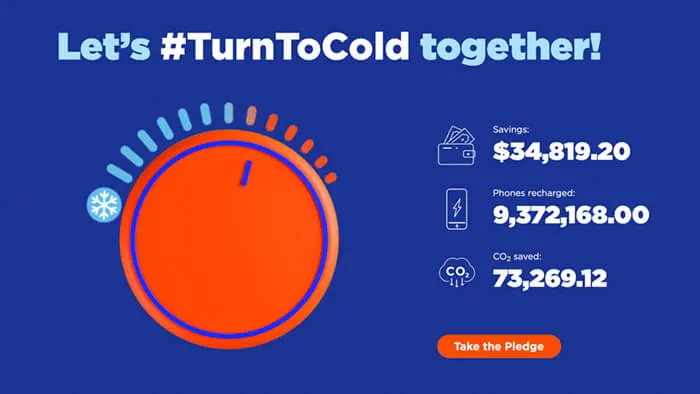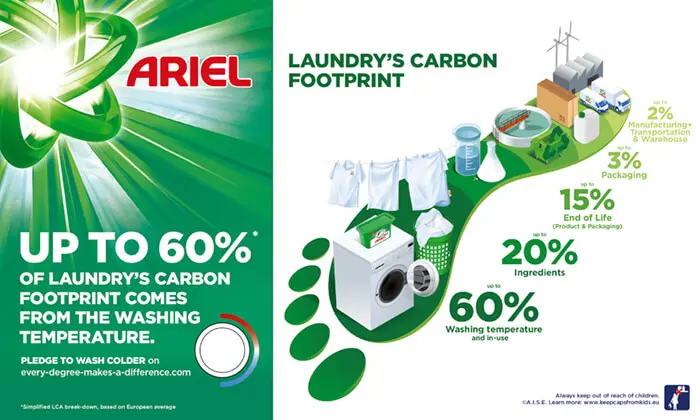6/16/2021
Can washing your clothes on cold do a world of good?
When you take into account everything from the manufacturing process to the packaging used for your detergent, the most significant environmental impact your laundry has is the energy used to heat the water in your washing machine. To better understand how all of this works, our Fabric Care brands use a research method called the Life Cycle Assessment (LCA) to evaluate the environmental impact of the way we design our products, to how we manufacture and ship them all the way to how consumers use them.
When our brands looked at the data, they found that the biggest impact on CO2 emission by far is down to one simple action: the water temperature we select on our washing machines. That’s why Tide and Ariel are leading the way to a more sustainable future by encouraging people to switch to cold-water washing.
90 percent of the energy in a load of wash comes from heating water to do it— two-thirds of all the greenhouse gas emissions in the Tide lifecycle.
Our Ariel brand team reviewed research conducted by the Energy Saving Trust, which confirms that washing at 30°C rather than 40°C reduces your energy consumption up to 57 percent per cycle. Just to give you an idea of the scale of that switch: if we turned our laundry wash temperature in Europe from 40 °C to 30 °C we could save almost 3,5million tons of CO2 per year. Roughly the equivalent of taking 2 million cars off the road.
By switching to cold water, you can reduce the amount of energy used by your machine — helping to decrease the overall environmental impact of your laundry load.
Check out how Tide and Ariel are inspiring more people to use cold water to save energy and do a world of good, not by only delighting consumers through superior product performance, but also by changing behaviors and driving positive impact on the environment.

Tide: 'Cold Callers' Are Calling Consumers to #TurnToCold
Tide is reinventing clean with the goal to make laundry more sustainable at every step of the process. Washing in cold is not only beneficial for you and your wallet, but for the environment, too.
The effects can be large as consumers can save 90 percent of the energy of every load of laundry on average just by switching from hot to cold – which reduces the impact of a load of laundry on the environment significantly.* In the end, Washing in cold water can save consumers up to $150 a year on their energy bill.**
And why Tide? Tide cleans better in cold water than the bargain brand does in hot.***
That’s why Tide has been on a campaign to get consumers to switch to cold-water washing. Tide has brought two of the coldest icons in pop culture, Ice-T and Stone Cold Steve Austin on board to convince everyone to #TurnToCold. Click here to join the Cold Callers in their mission for a better future!
To learn more about cold-water washing, learn how much you can save and how to get involved – visit here.
Ariel: Every Degree Makes a Difference
When doing your laundry, you may not be thinking about protecting the planet – but Ariel is.
Ariel joined National Geographic in Greenland, where two scientists at the forefront of climate change look at how small changes at home can make a big difference — including switching to cold water for laundry.
According to Ariel, the most efficient way to save energy is to turn down the washing temperature on your machine to 30°C or below. Click here for more tips for cold-wash laundry.
Learn how going colder could help stop the world from getting warmer.

At P&G, we believe that sustainability can be a driver of irresistible superiority and innovation can make responsible consumption irresistible. Our brands, like Tide and Ariel, are making it simple for households to be more sustainable without tradeoffs in product performance or convenience.
Ambition 2030 is our commitment to environmental sustainability that includes a new set of goals and an embrace of new practices intended not just to reduce our footprint and conserve precious resources — ultimately leaving it better than we found it.
To learn more about our environmental sustainability commitments, visit https://us.pg.com/environmental-sustainability/.


